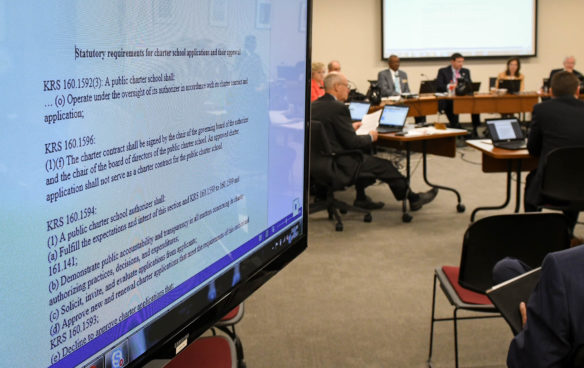
House Bill 520 (2017) cleared the way for the first charter schools in the state and during its regular meeting on Oct. 4, the Kentucky Board of Education approved four regulations governing the establishment and operation of public charter schools.
Photo by Bobby Ellis, Oct. 4, 2017
(FRANKFORT, Ky.) – Public charter schools in Kentucky have moved one step closer to reality.
House Bill 520 (2017) cleared the way for the first charter schools in the state and during its regular meeting Oct. 4, the Kentucky Board of Education approved four regulations, one as amended, governing the establishment and operation of public charter schools. The regulations address student application, lottery and enrollment; the evaluation of charter school authorizers; the process for a charter school’s appeal of an authorizer’s decision; and conversion charter school petition, conversion and operation.
Under 701 KAR 8:010, a uniform online student application will be used. Students would be wait-listed in the order their application is received. The regulation prohibits discrimination in charter enrollment and allows a student to enroll after the beginning of the school year as long as the school has room for the student.
Under the law, every local board of education, a collaborative of local school boards, and the mayors of Lexington and Louisville may review applications and authorize charter schools. The regulation outlining the process for the evaluation of charter school authorizers, 701 KAR 8:020, defines training and performance requirements related to charter contracts, financial solvency, reporting, closure and the duties of the charter board of directors. The regulation also clarifies the prohibition on authorizers from approving a charter from a for-profit organization or one that is organized for religious purposes. The KBE amended the regulation to modify the Charter School Application. Also, a performance framework and model contract between the charter and authorizer is included by reference for guidance.
701 KAR 8:030 establishes the procedural requirements for a charter school’s appeal of an authorizer’s decision to revoke or non-renew a charter. A charter applicant may appeal a decision to the Kentucky Board of Education.
The final regulation, 701 KAR 8:040 establishes the process to be used to convert an existing public school to a charter school. Virtual charter schools are not allowed under the statute.
“I think the regulations and the application create a framework and an extraordinarily comprehensive system of information, monitoring and oversight that make it a win-win for all parties – for applicants and for authorizers – to carry out the work on charter schools with the best capacity to do so,” board member Gary Houchens said.
Final amended charter regulations and the documents incorporated by reference will be available by Oct. 13. For more information, visit the Kentucky Department of Education’s Public Hearing Information webpage.
The charter regulations now move through the regulatory process with a public comment period Nov. 1-30 and a public hearing on the regulations scheduled for Nov. 21. It is anticipated that the first charter school could open in Kentucky as early as fall 2018.
Also during the meeting, the board approved its 2018-20 biennial budget request including:
- increased SEEK transportation funding to local districts from about 60 percent in the current biennium to 100 percent in 2019-20;
- Senate Bill 1 (2017) assessments, standards revisions, industry certifications and school improvement; and Advanced Placement and International Baccalaureate test fees;
- full-day kindergarten (increasing state support from about 50 percent to 100 percent);
- funds to support increasing the number of 4-year-olds served in public preschool from 160 to 200 percent of the federal poverty level;
- career advisory positions for the 95 career and technical centers throughout the state;
- transforming state and locally operated centers to regional career academies driven by labor market data;
- industry certification costs;
- charter school central office support;
- school report card and instructional technology system enhancements;
- Kentucky Education Technology System funding (including the cost of a 70 percent increase in K-12 Internet usage);
- additional positions at the Kentucky School for the Blind; and
- defined calculations for retirement, increment, health insurance, life insurance and social security, rent and utilities.
The budget request will be submitted to the governor’s office in November, after which the governor will submit a budget to the General Assembly by the 10th day of the 2018 regular session.
The board also discussed its legislative policy priorities for the 2018 regular session, which currently includes assistance to districts in financial crisis, support for implementing the Commissioner’s Dyslexia Task Force, essential skills, student-well being/social-emotional learning and a 3rd-grade reading initiative. The proposed legislative priorities also include a statement of support for tax reform and pension reform. The board will finalize its legislative priorities at its December meeting.
Additionally, at its meeting the board approved:
- new district facility plans for Caverna Independent and Nicholas County School Districts;
- a district facility plan amendment for Clinton County School District;
- the 2017-18 Local District Tax Rates Levied;
- the appointment of Emilee Morgan, instructional supervisor at Buckner Elementary, Oldham Co. Schools, to the Kentucky Writing Program Advisory Committee;
- a waiver of 704 KAR 3:305, Section 2 for Carroll, Gallatin, Henry, Owen and Trimble County School Districts (iLEAD Academy);
- 704 KAR 3:370, Kentucky Framework for Personnel Evaluation;
- a request for an Alternative Model of School-Based Decision Making (SBDM) from Atherton High School, Jefferson County Public Schools; and
- a request by the Lincoln Co. Board of Education for a waiver of 702 KAR 1:160, School Health Services, Section 4.
During the meeting, the board shared with Commissioner Stephen Pruitt the results of a discussion from Tuesday’s work session on his self-evaluation. The board commended the commissioner for his leadership and indicated that the board was convinced he is the right person to take public education in Kentucky forward. The board praised the commissioner’s efforts on relationship building and collaboration, especially in regard to the development of the new accountability system; development of the strategic plan; the support of staff; progress on science assessments; continued improvements and stability at the Kentucky School for the Blind and Kentucky School for the Deaf; and adoption of a charter school law and development of charter regulations.
The board indicated that in the next year, it would like the commissioner to focus on innovation, efficiency and closure of the achievement gap; implementation of the accountability system – especially work on essential skills and opportunity and access; revision of academic standards; and his goals to expand career and technical education, among other things.
“I’m going to continue to bang the drum and fight the fight to close the achievement gap,” Pruitt said. “I thank you for the opportunity to do this job every day.”
The board will finalize the commissioner’s goals and performance evaluation at its December meeting.
The board also named Dr. Blake Haselton as the winner of its 2017 David Karem Award and northern Kentucky attorney C. Ed Massey as the winner of its 2017 Joseph W. Kelly Award. Commissioner Stephen Pruitt presented Belfry Area Technology Center welding instructor Jonathan Bogar as the winner of the 2017 Kevin M. Noland/Mary Ann Miller Award.
Visit the board portal to access the agenda and supporting materials online.
The next regular meeting of the Kentucky Board of Education is scheduled for Dec. 6.




Leave A Comment